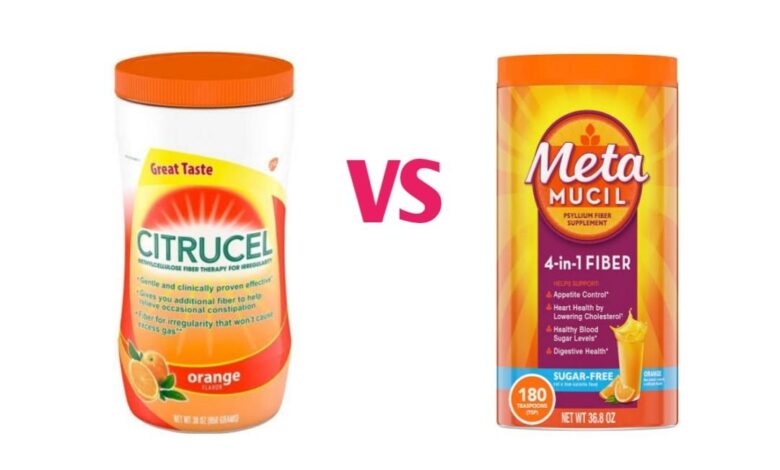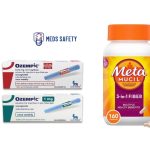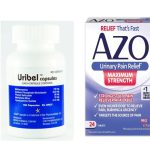Citrucel vs Metamucil: Differences, Similarities, Which is better?

Fiber is one of the main reasons whole plant foods are good for you. Growing evidence shows that adequate fiber intake may benefit your digestion and reduce your risk of chronic disease.
Many of these benefits are mediated by your gut microbiota — the millions of bacteria that live in your digestive system. However, not all fiber is created equal. Different types have different health effects.
What is Citrucel?
Citrucel is a common fiber supplement available as caplets and powders, it is designed to relieve constipation by adding bulk to your stool, helping it pass through your digestive tract more easily. This is due to its content of methylcellulose fiber. It also contains several other ingredients, including food dyes, natural flavors, and preservatives such as citric acid.
What is Metamucil?
Metamucil is a bulk-forming fiber supplement with laxative properties. It is used to treat occasional constipation or bowel irregularity. Metamucil may also help lower cholesterol when used together with a diet low in cholesterol and saturated fat.
What is the difference between Citrucel and Metamucil?
The basic difference between Citrucel and Metamucil is the type of fiber they contain. While Citrucel is made from Methyl Cellulose, a chemical compound that is derived from cellulose, Metamucil on the other hand is made from psyllium seed husk that is ground into a powder. The plant is native to Pakistan and India.
Citrucel vs Metamucil which is better?
This depends on your specific needs, if you prefer an all-natural product then Metamucil is for you but if you are among those who cannot tolerate the fermentable fiber in Metamucil then it is better to avoid it and go for Citrucel because it’s less likely to cause gas.
Common side effects of Citrucel include:
- Flatulence (gas)
- Impaction.
- Excessive bowel activity.
- Abdominal pain.
Common side effects of Metamucil include;
- Abdominal cramps
- Bloating, and changes in stool consistency
- Constipation that lasts longer than 7 days
- Rectal bleeding
- Severe stomach pain.
In terms of calories, 1 scoop of Metamucil Multihealth Fiber Orange Smooth provides 45 calories while 1 scoop of regular Citrucel powder has 60 calories.
Can I take Citrucel and Metamucil together?
No, you should avoid taking Citrucel and Metamucil together to avoid overdose. Excessive fiber can result in various issues such as:
- Abdominal pain.
- Bloating.
- Diarrhea.
- Short-term weight gain.
- Constipation.
- Reduced blood sugar levels.
Fiber supplements like Citrucel and Metamucil can be an easy and effective way to increase your fiber intake and promote regularity.
However, unless advised by a healthcare professional, you shouldn’t use Citrucel or Metamucil for longer than 1 week.
If constipation persists beyond 1 week, consult a healthcare professional. They can help you determine whether there are other issues to address to treat the problem at its root.
Additionally, keep in mind that fiber supplements like Citrucel and Metamucil don’t boast the same nutrients as fiber-rich foods like fruits, vegetables, whole grains, legumes, nuts, and seeds.
Therefore, while Citrucel and Metamucil can help boost your fiber intake in the short term, make sure to pair them with a healthy, well-rounded diet to ensure that your nutritional needs are being met.
What medications can interact with Metamucil and Citrucel?
Taking Metamucil or Citrucel at the same time with other medications may result in the medication not working well or getting swept along with the fiber and excreted instead of being fully absorbed. Metamucil and Citrucel may affect the way the following medications work:
• amlodipine
• aspirin
• atorvastatin
• biotin
• Fish Oil (omega-3 polyunsaturated fatty acids)
• gabapentin
• hydrochlorothiazide
• levothyroxine
• lisinopril
• magnesium oxide
• melatonin
• metformin
• multivitamin
• omeprazole
• pantoprazole
• Probiotic Formula (bifidobacterium infantis / lactobacillus acidophilus)
• trazodone
• Vitamin B12 (cyanocobalamin)
• Vitamin C (ascorbic acid)
• Vitamin D3 (cholecalciferol)
If you are currently being treated with any of the following medications, you should not use fiber supplements without first talking to your health care provider.
You may also find useful information about Benefiber Vs Metamucil in the Video below





